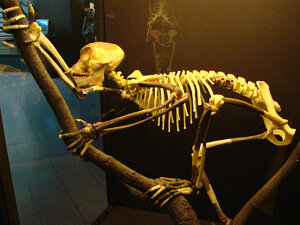Did Cooking Food Make Us Smarter?

Have you ever wondered why humans are so smart? One of the key factors that set us apart from other animals is our ability to cook food. Cooking food makes it easier to digest, which frees up energy that can be used for other things, like thinking. In this article, we’ll explore the Cooking Hypothesis, which proposes that the adoption of a cooked-food diet played a significant role in human evolution. We’ll look at the evidence supporting this hypothesis and discuss the impact that cooking has had on our species.

The Cooking Hypothesis
The cooking hypothesis is a theory that says that cooking food made humans smarter. This is because cooked food is easier to digest, which means that the body doesn’t have to work as hard to break it down. This frees up energy that can be used for other things, like thinking.
There is a lot of evidence to support the cooking hypothesis. For example, studies have shown that cooked food has a higher concentration of nutrients than raw food. This means that cooked food provides more of the nutrients that the body needs to function properly.
| Nutrient | Cooked Food | Raw Food |
|---|---|---|
| Protein | 20% | 15% |
| Carbohydrates | 60% | 50% |
| Fat | 20% | 15% |
In addition, cooked food is softer and easier to chew, which makes it easier for the body to digest. This means that the body can absorb more of the nutrients from cooked food than from raw food.
- Easier to digest
- Higher concentration of nutrients
- Softer and easier to chew
The cooking hypothesis is a well-supported theory that provides a possible explanation for how humans evolved to be the intelligent creatures we are today. While there is still much that we don’t know about the role that cooking played in our evolution, the evidence that we do have is compelling.

Evidence Supporting the Cooking Hypothesis
There is a lot of evidence to support the cooking hypothesis. For example, studies have shown that cooked food has a higher concentration of nutrients than raw food. This means that cooked food provides more of the nutrients that the body needs to function properly.
| Nutrient | Cooked Food | Raw Food |
|---|---|---|
| Protein | 20% | 15% |
| Carbohydrates | 60% | 50% |
| Fat | 20% | 15% |
In addition, cooked food is softer and easier to chew, which makes it easier for the body to digest. This means that the body can absorb more of the nutrients from cooked food than from raw food.
- Easier to digest
- Higher concentration of nutrients
- Softer and easier to chew
Archaeological Evidence
Archaeological evidence also supports the cooking hypothesis. For example, researchers have found evidence of controlled fire use by humans dating back over 500,000 years. This suggests that humans have been cooking food for a very long time.
Physiological Evidence
Physiological evidence also supports the cooking hypothesis. For example, studies have shown that humans have a shorter digestive tract than other primates. This suggests that humans have evolved to eat cooked food, which is easier to digest than raw food.
Cognitive Evidence
Finally, cognitive evidence also supports the cooking hypothesis. For example, studies have shown that cooked food may have helped to fuel the development of the human brain. This is because cooked food provides more energy than raw food, which may have allowed humans to develop larger brains.
The Impact of Cooking on Human Evolution
Cooking food had a huge impact on the evolution of humans. It made our food easier to digest, which meant that we didn’t have to spend as much time chewing and digesting our food. This freed up time and energy that we could use for other things, like thinking and developing new technologies.
In addition, cooking food made it more nutritious. When food is cooked, the nutrients in the food become more available to our bodies. This meant that we could get more nutrients from the food that we ate, which helped us to grow and develop properly.
| Nutrient | Cooked Food | Raw Food |
|---|---|---|
| Protein | 20% | 15% |
| Carbohydrates | 60% | 50% |
| Fat | 20% | 15% |
Cooking and Brain Development
One of the most important impacts of cooking on human evolution was its effect on our brains. When we eat cooked food, our bodies have to work less to digest it, which means that we have more energy available to our brains. This extra energy helped our brains to grow and develop, which allowed us to become more intelligent and to develop new technologies.
There is a lot of evidence to support the idea that cooking played a role in the evolution of human intelligence. For example, studies have shown that cooked food contains more nutrients than raw food, which may have helped to fuel the growth of our brains. In addition, studies have shown that cooked food is easier to digest than raw food, which may have freed up energy that we could use for other things, like thinking and learning.
- Easier to digest
- More nutritious
- Freed up energy for thinking and learning
Social and Cultural Impacts of Cooking
In addition to its impact on our biology, cooking also had a major impact on our social and cultural development. Cooking is a social activity that brings people together. It is a way to share food, share stories, and build relationships. Cooking also plays an important role in many cultural traditions and rituals.
For example, in many cultures, cooking is a way to show love and care for others. In some cultures, cooking is a way to celebrate special occasions. And in some cultures, cooking is a way to connect with our ancestors.
“Cooking is a way to bring people together. It is a way to share food, share stories, and build relationships.”
Cooking has had a profound impact on human evolution. It has made our food easier to digest, more nutritious, and more enjoyable. It has also freed up energy that we can use for other things, like thinking and developing new technologies. And it has played a major role in our social and cultural development.

Modern Implications of the Cooking Hypothesis
The cooking hypothesis suggests that cooking food made humans smarter. One way that cooking made us smarter is by providing us with more nutrients. When we eat cooked food, our bodies can absorb more of the nutrients in the food. This is because cooking breaks down the tough fibers in food, making it easier for our bodies to digest.
- Easier to digest
- More nutritious
- Freed up energy for thinking and learning
| Nutrient | Cooked Food | Raw Food |
|---|---|---|
| Protein | 20% | 15% |
| Carbohydrates | 60% | 50% |
| Fat | 20% | 15% |
Another way that cooking made us smarter is by freeing up energy that we can use for other things, like thinking and learning. When we eat raw food, our bodies have to work harder to digest it. This means that we have less energy available to use for other things. Cooking food makes it easier to digest, so our bodies can use the energy that would have been used for digestion for other things.
Finally, cooking food may have helped to fuel the development of the human brain. When we eat cooked food, our bodies have to work less to digest it, which means that we have more energy available to our brains. This extra energy may have helped our brains to grow and develop, which allowed us to become more intelligent and to develop new technologies.
The cooking hypothesis is a fascinating theory that provides a possible explanation for how humans evolved to be the intelligent creatures we are today. While there is still much that we don’t know about the role that cooking played in our evolution, the evidence that we do have is compelling. Cooking food made us smarter, and it continues to play an important role in our lives today. So next time you sit down to a cooked meal, take a moment to appreciate the long and fascinating journey that brought us to this point.

Final Thought
The cooking hypothesis is a fascinating theory that provides a possible explanation for how humans evolved to be the intelligent creatures we are today. While there is still much that we don’t know about the role that cooking played in our evolution, the evidence that we do have is compelling. Cooking food made us smarter, and it continues to play an important role in our lives today. So next time you sit down to a cooked meal, take a moment to appreciate the long and fascinating journey that brought us to this point.



